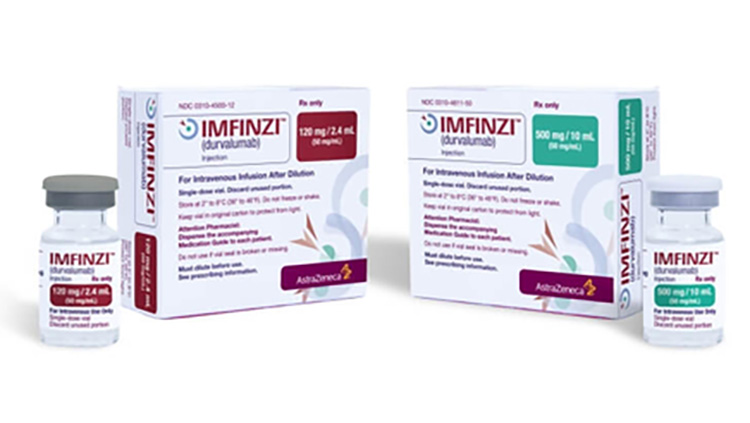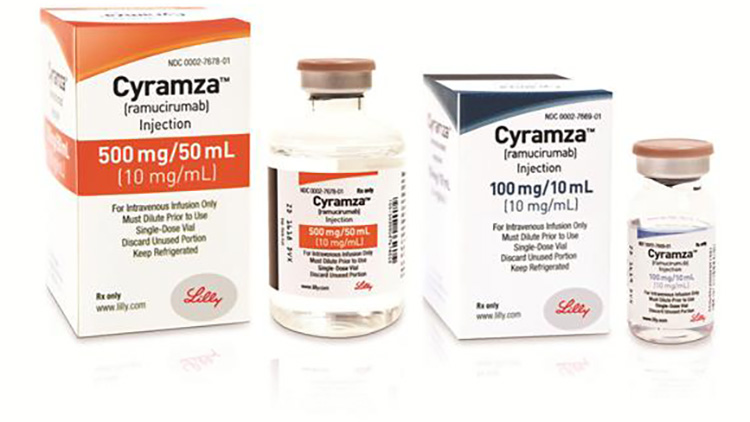Imfinzi (durvalumab) vs Cyramza (ramucirumab)
Imfinzi (durvalumab) vs Cyramza (ramucirumab)
Imfinzi (durvalumab) is an immune checkpoint inhibitor that works by helping the immune system recognize and attack cancer cells, and is commonly used in the treatment of certain types of lung cancer and bladder cancer. Cyramza (ramucirumab), on the other hand, is a vascular endothelial growth factor (VEGF) Receptor 2 antagonist that works by inhibiting the blood supply to tumors and is used for different types of cancers, including gastric cancer, colorectal cancer, and certain types of lung cancer. The choice between Imfinzi and Cyramza would depend on the specific type and stage of cancer, the patient's overall health, and the treatment plan recommended by the healthcare provider, as they target different pathways in cancer treatment.
Difference between Imfinzi and Cyramza
| Metric | Imfinzi (durvalumab) | Cyramza (ramucirumab) |
|---|---|---|
| Generic name | Durvalumab | Ramucirumab |
| Indications | Non-small cell lung cancer, urothelial carcinoma, extensive-stage small cell lung cancer | Gastric cancer, non-small cell lung cancer, colorectal cancer, hepatocellular carcinoma |
| Mechanism of action | PD-L1 inhibitor, immune checkpoint inhibitor | VEGFR2 antagonist, angiogenesis inhibitor |
| Brand names | Imfinzi | Cyramza |
| Administrative route | Intravenous infusion | Intravenous infusion |
| Side effects | Fatigue, musculoskeletal pain, constipation, decreased appetite, nausea, peripheral edema, urinary tract infection, pyrexia, dyspnea, cough, pneumonitis | Hypertension, diarrhea, headache, hyponatremia, decreased appetite, abdominal pain, vomiting, fatigue |
| Contraindications | Patients with severe hypersensitivity to durvalumab or any of its excipients | Patients with severe hypersensitivity to ramucirumab or any of its excipients |
| Drug class | Monoclonal antibody, Immune checkpoint inhibitor | Monoclonal antibody, Angiogenesis inhibitor |
| Manufacturer | AstraZeneca | Eli Lilly and Company |
Efficacy
Imfinzi (Durvalumab) Efficacy in Lung Cancer
Imfinzi (durvalumab) is a checkpoint inhibitor that targets the PD-L1 protein found on the surface of cancer cells. By blocking the interaction between PD-L1 and PD-1 on immune cells, durvalumab helps the immune system to detect and attack cancer cells. In the context of lung cancer, durvalumab has shown efficacy particularly in the treatment of stage III non-small cell lung cancer (NSCLC) that cannot be removed surgically. The PACIFIC trial, a pivotal study for this indication, demonstrated that durvalumab significantly improved median progression-free survival compared to placebo, establishing it as a standard treatment option for this group of patients following chemoradiation therapy.
Cyramza (Ramucirumab) Efficacy in Lung Cancer
Cyramza (ramucirumab) is a vascular endothelial growth factor receptor 2 (VEGFR2) antagonist, which works by inhibiting the blood supply to tumors, thereby inhibiting their growth. In the treatment of lung cancer, ramucirumab has been evaluated for its efficacy in combination with chemotherapy. For patients with advanced non-small cell lung cancer (NSCLC) who have progressed on or after platinum-based chemotherapy, ramucirumab in combination with docetaxel has been shown to improve overall survival and progression-free survival compared to chemotherapy alone. This was demonstrated in the REVEL trial, which supported the approval of ramucirumab for this indication.
Combination Therapy in Lung Cancer
The combination of immunotherapy and anti-angiogenic therapy is being explored to enhance the efficacy of lung cancer treatment. While there are no large-scale definitive trials completed that combine durvalumab and ramucirumab specifically for lung cancer, the rationale behind combining drugs like durvalumab with anti-angiogenic agents like ramucirumab is to potentially create a more hostile environment for cancer cells and improve immune-mediated tumor destruction. Clinical trials are ongoing to assess the safety and efficacy of such combinations.
Conclusion
Both Imfinzi (durvalumab) and Cyramza (ramucirumab) have individually shown efficacy in the treatment of certain types of lung cancer. Durvalumab has been particularly effective in treating patients with stage III NSCLC after chemoradiation, while ramucirumab has been used successfully in combination with chemotherapy for advanced NSCLC following the progression on prior treatment. The future of lung cancer therapy may involve combinations of these and other drugs to further improve outcomes for patients with this challenging disease.
Regulatory Agency Approvals
Imfinzi
-
European Medical Agency (EMA), European Union

-
Food and Drug Administration (FDA), USA

-
Health Canada

-
Therapeutic Goods Administration (TGA), Australia

-
Medsafe (NZ)

Cyramza
-
European Medical Agency (EMA), European Union

-
Food and Drug Administration (FDA), USA

-
Health Canada

-
Therapeutic Goods Administration (TGA), Australia

-
Medsafe (NZ)

Access Imfinzi or Cyramza today
If Imfinzi or Cyramza are not approved or available in your country (e.g. due to supply issues), you can access them via Everyone.org.
How it works

Make an enquiry
Choose the medicine you want to buy, answer a couple of questions, and upload your prescription to speed things up. We’ll get back to you within 24 hours.


Make an enquiry
Choose the medicine you want to buy, answer a couple of questions, and upload your prescription to speed things up. We’ll get back to you within 24 hours.


Breeze through the paperwork
We'll guide you through the required documents for importing unapproved medicine, ensuring you have all the necessary information.


Get a personalized quote
We’ll prepare a quote for you, including medicine costs and any shipping, administrative, or import fees that may apply.


Receive your medicine
Accept the quote and we’ll handle the rest - sourcing and safely delivering your medicine.

Some text on this page has been automatically generated. Speak to your physician before you start a new treatment or medication.
Let's talk
If you have any questions, call us or send us a message through WhatsApp or email:
Contact us




